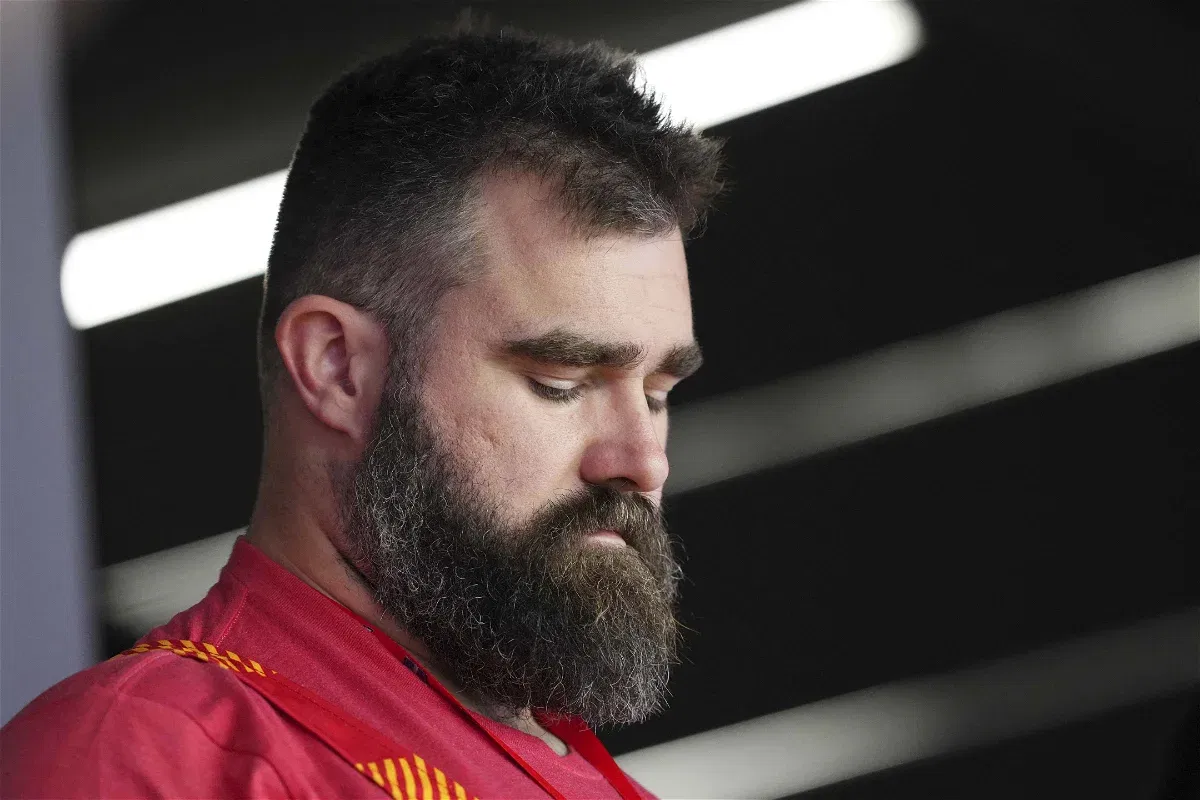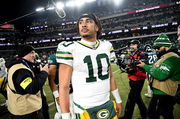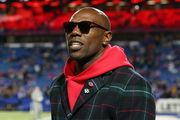

With Christian McCaffrey inactive because of a strained calf/Achilles, the San Francisco 49ers had about 30% of the team’s offense from 2023 on the sideline. So Jason Kelce was not really sure if they could clinch a victory against the Jets and he shared his take during his ESPN debut with Ryan Clark. Both agreed that not having McCaffrey was a “huge loss.” But after the San Francisco 49ers’ victory 32-19 over the New York Jets and the way Jordan Mason, who was third on the team’s depth chart, led his team, has forced Kelce to eat his own words.
Watch What’s Trending Now!
Kelce shared the clip of his pre-game analysis of the 49ers sans Christian McCaffrey on X and admitted, “Welp, this aged about as well as warm milk.”
Kelce had previously opined, “There are so many design things in the game because of his ability to do a lot. He can be in the backfield, come out wide, and be a receiver and he’s a guy not only out there, he’s dynamic out there.” Hey, sometimes the pros can get it wrong too!
ADVERTISEMENT
Jordan Mason, the unheralded backup, stepped into McCaffrey’s cleats and ran roughshod over New York’s defense. The former undrafted free agent racked up a whopping 147 rushing yards and a touchdown on 28 carries. Mason’s performance was a masterclass in coach Kyle Shanahan’s ‘next man up’ philosophy, proving that sometimes the brightest stars are the ones you least expect.
Second-stringer Elijah Mitchell was out due to a season-ending hamstring injury during final roster cuts in August. So, Mason had to rise up to the opportunity he received.
Kyle Shanahan has a knack for turning relative unknowns into backfield stars. Mason joins a long list of 49ers running backs who’ve stepped up when called upon, including Raheem Mostert, Elijah Mitchell, Jeff Wilson, and Matt Breida. This track record begs the question: Why did ESPN and Jason Kelce so readily buy into the sky-is-falling narrative without McCaffrey?
ADVERTISEMENT
Welp, this aged about as well as warm milk https://t.co/sb5qRKDgZ3
— Jason Kelce (@JasonKelce) September 10, 2024
The answer might lie in ESPN’s penchant for star-powered storylines. While marquee players undoubtedly impact games, the network’s laser focus on individual talents often overshadows the depth and adaptability of well-coached teams. This bias isn’t just bad for analysis – it can lead fans astray, setting unrealistic expectations and overlooking potential breakout performances like Mason’s.
ADVERTISEMENT
Mason’s breakout game wasn’t just about individual brilliance. It was a testament to Shanahan’s offensive genius. The 49ers put together five drives of nine plays or more, with four covering at least 70 yards. They didn’t even need to rely heavily on third-down conversions, going 6 for 13. As NFL Research pointed out, the Jets’ 21:20 with possession was the lowest mark in any game in Aaron Rodgers‘ career.
However, this wasn’t just a case of one player rising to the occasion. The 49ers dominated time of possession, holding the ball for a staggering 38:40 compared to the Jets’ paltry 21:20. Brock Purdy completed 19 of 29 passes for 231 yards to six different targets, keeping New York’s defense on its heels all night.
ADVERTISEMENT
As the dust settled on Mason’s breakout performance, Jason Kelce’s self-deprecating tweet was a refreshing dose of humility, but there was another storyline brewing up amidst this that sheds light on a larger issue
Jason Kelce’s unfiltered debut exposes a tale of two standards!
Jason Kelce’s first night as an ESPN analyst wasn’t just notable for his misfired 49ers take. The former Eagles center made waves with his unfiltered style, dropping a casual reference to his ‘t–s’ that was not bleeped on national television.
ADVERTISEMENT
“It fits my belly now. I’ve lost a little bit of weight, but my t–s are still struggling,” Kelce said about his tight, plain white, long-sleeved dress shirt, while on air. This stark contrast to ESPN’s usual censorship policies raised eyebrows and sparked debate among viewers.
The network’s selective approach to profanity became glaringly apparent. While personalities like Pat McAfee face censoring for colorful language, Kelce’s slip went unchecked. Was this a mere mistake on ESPN’s part or a willingness to bend its own rules based on the analyst’s star power or perceived marketability? Only they can answer this.
Top Stories
NFL Make Final Punishment Decision on Controversial Patrick Mahomes Incident

Tom Brady Hints at Nefarious Actions From Bears After Packers Lose Sideline Heaters

Matt LaFleur Blames Locker Room After Issuing Painful Statement on Packers’ Loss

Bears DE Awaits Punishment for Controversial Jordan Love Incident After Packers Shared Injury Update

Prayers Pour In From Terrell Owens as 275lbs Former Cowboys Player Announces Major Health News

ADVERTISEMENT

When fans asked Jason Kelce on social media if he could say ‘t–s’ on TV, he cheekily replied, “I don’t know. Did they bleep it?” This playful response only underscored the confusion surrounding ESPN’s content policies. Are some analysts given more leeway to be themselves, while others are held to stricter standards?
ADVERTISEMENT
ADVERTISEMENT
ADVERTISEMENT
ADVERTISEMENT

